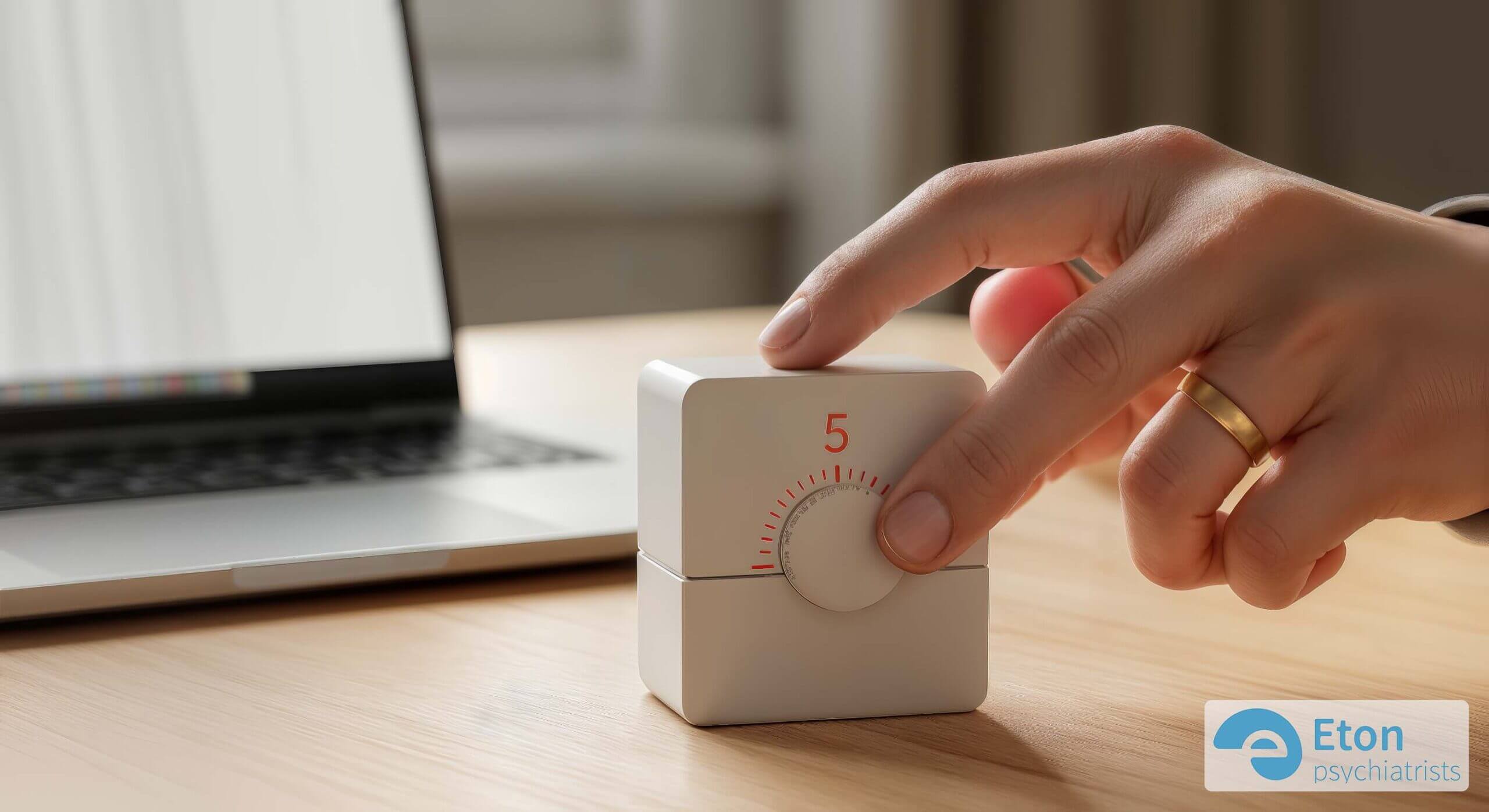
Adult ADHD: Daily Habits That Change Everything
Listen to the Article
For those on the go or who prefer listening, you can play the full audio version of this deep dive below.

Living with ADHD often feels chaotic. The solution isn’t a rigid routine but rather a flexible, ADHD-friendly framework. This article, from the clinical team at Eton Psychiatrists, explores the small, sustainable daily habits you can start today to manage symptoms, reduce overwhelm, and find your focus.
Table of Contents
Why Are Daily Habits So Difficult for Adults with ADHD?
If you have ADHD, you have probably been told to “just try harder,” “use a planner,” or “be more disciplined.” You may have tried, only to find the habits last a few days before life descends back into chaos. This is not a moral failing or a lack of willpower. It is a matter of neuroscience.
The core challenge for many adults with ADHD is executive dysfunction. This is a term for a set of cognitive skills, managed by the brain’s frontal lobe, that act as your personal “CEO.”
These skills include:
- Task Initiation: The ability to start a task, even one you want to do.
- Planning & Prioritising: Deciding what to do first.
- Working Memory: Holding information in your mind to complete a task.
- Emotional Regulation: Managing feelings of frustration or boredom.
When these skills are impaired, “simple” tasks like building a routine can feel like climbing a mountain.
Two specific effects of executive dysfunction sabotage habit-building, which are known as “time blindness” and “task paralysis.”
- Time Blindness is the inability to accurately sense the passage of time. For an adult with ADHD, time is often either “Now” or “Not Now.” This explains why a five-minute task can be put off for hours, or why you might look up and realise three hours have passed.
- Task Paralysis is the overwhelming feeling of being “stuck” when faced with a task. It might be a big project or something as simple as replying to an email. Your brain sees too many steps, gets overwhelmed, and simply shuts down.
The key to ADHD management is to stop using neurotypical strategies. You must build habits that work with your ADHD brain, not against it.
5 Foundational Habits for Your ADHD Routine
Forget a complex, hour-by-hour schedule. A sustainable routine is built on small, consistent foundational habits. Here are five to start with.
Habit 1: The “10 Minute Tidy”
One of the most effective ADHD habits has nothing to do with the morning. It actually starts the night before.
The goal of a nightly routine is to reduce “friction” for your future self. Your morning brain has limited executive function, so you want to make getting started as easy as possible. Before you wind down, spend just 10 minutes doing these three things:
- Set up your coffee or breakfast. Put the mug by the kettle and get the bowl out. It’s one less decision to make tomorrow.
- Pack your bag. Get your work laptop, gym kit, and keys in your bag by the door.
- Clear one high-impact surface. This isn’t about cleaning the whole kitchen. It just means putting the dishes in the dishwasher or wiping the bathroom counter. A small visual win can set a positive tone for the next day.
This habit works by moving morning decisions to the evening when you may have more mental energy, so your morning-self can just execute the plan.
Habit 2: Master Your Morning
A good morning routine for adult ADHD is not about waking up at 5 a.m. to meditate and journal. It’s about getting three essential things into your system before your brain gets pulled in a million directions.

- Hydrate & Medicate: Before coffee or your phone, drink a full glass of water. If you take medication, take it at the same time every day. This creates a simple, consistent anchor point for your entire day.
- Get 10 Minutes of Sunlight: As soon as you can, open the curtains or step outside. Natural light is a powerful signal that tells your brain to stop producing melatonin and start producing serotonin. This helps regulate your circadian rhythm, which is often disrupted in adults with ADHD.
- Eat a Protein-Rich Breakfast: Many ADHD brains are dopamine-seeking. Sugar-heavy breakfasts like cereal or a pastry cause a blood sugar spike and a terrible crash, worsening inattention and irritability. Protein from eggs, yoghurt, or a protein shake provides a slow, stable release of energy and the amino acids needed to build neurotransmitters like dopamine.
Habit 3: Conquer Task Paralysis
Task paralysis is one of the most frustrating burdens of ADHD. The “5-Minute Rule” is a classic cognitive behavioural therapy (CBT) technique to break it.
The rule is simple: you only have to do the dreaded task for five minutes.

Set a timer and start. If you want to stop after five minutes, you have full permission to do so. What you will often find is that starting was the hardest part. The activation energy required to begin is the true barrier, not the task itself.
This “micro-habit” strategy can be applied to anything and retrains your brain to see that starting is not as painful as it seems.
Habit 4: Manage Time Blindness
You cannot manage what you cannot see. For people with time blindness, time is invisible. The solution is to make it visible and audible.
Using timers for everything is the most crucial habit for managing time.
- The Pomodoro Technique: Work on a task for 25 minutes, then take a 5-minute break. This is incredibly effective for the ADHD brain, which works best in short, focused bursts.
- Transition Timers: Set an alarm for 10 minutes before you need to leave the house. This creates an external buffer that your brain can’t ignore.
- Visual Timers: For tasks like getting ready, a visual timer such as a time-tracker app or even a sand timer can be more effective than a number, as it shows the volume of time passing.
You can also try “body doubling,” a popular ADHD management strategy where you perform a task in the presence of another person. Their presence acts as a gentle, external anchor for your focus. This can be a friend who comes over while you study or a workout partner that keeps you on track.
Habit 5: The “Brain Dump”
Do you find it impossible to sleep because your brain “wakes up” at 10 p.m. with a list of everything you forgot to do, every brilliant idea you’ve ever had, and that one cringeworthy thing you said in 2009?
This is a common experience because the ADHD brain has trouble “closing tabs.” The “Brain Dump” is a five-minute habit to fix this.

Keep a notebook by your bed. Before you try to sleep, write down everything that is spinning in your head. Whether it is to-dos for tomorrow, worries, ideas, or people to email, put pen to paper and jot it down.
Getting it all out of your head and onto the paper externalises the thoughts. This gives your brain permission to let them go, knowing they are safely captured for tomorrow so that you can drift off.
What to Do When You “Fall Off” Your Routine
The most important habit of all is self-compassion.
You will have days where you forget your water, skip the tidy, and live in chaos. This is a symptom, not a failure. Many adults with ADHD suffer from “all-or-nothing” thinking, where they miss one day of a new habit and declare the entire system broken, giving up completely.
The goal is to be consistent, not perfect. You have to remember that perfect is the enemy of good.
- Don’t “break the chain.” If you miss a day, your only goal is to do it the next day.
- See it as data. You might notice, “I skipped my morning routine all week because I was staying up too late.” This shows that the problem isn’t the morning habit, but the evening one.
- The key is to restart without quitting. Every single minute offers a new chance to make a good decision. Forgetting your protein breakfast doesn’t ruin the day; it just means you can make your next meal a good one.
When Daily Habits Aren’t Enough
These habits can be life-changing, but they are often most effective when combined with a comprehensive treatment plan. If you are still feeling overwhelmed, it is not a sign of weakness but a sign that you need better tools.
Professional ADHD management, such as that offered at Eton Psychiatrists, can help you understand the why behind your struggles. Treatments like Cognitive Behavioural Therapy (CBT) for ADHD are specifically designed to help you build these exact routines, manage emotional dysregulation, and develop strategies that last.
Why Trust Eton Psychiatrists?
At Eton Psychiatrists, we are a specialist clinic for ADHD and Autism. Our team of consultant psychiatrists and therapists understands that ADHD is a complex neurodevelopmental condition, not a failure of character. We provide evidence-based, compassionate care that goes beyond just medication by incorporating therapy and practical strategies to help you build a life where your brain can thrive.
Building new habits is a journey. Start with one, be kind to yourself, and know that if you need support, our team is here to help.
Summary
- Executive Dysfunction is the Cause: Habits are hard for people with ADHD not due to laziness, but due to neurological factors like executive dysfunction, time blindness, and task paralysis.
- ADHD-Friendly Habits Work: The solution is 5 foundational habits like the “10-Minute Tidy” (evening-first), a simple morning routine (water, light, protein), the “5-Minute Rule,” using timers, and a nightly “Brain Dump.”
- Consistency Over Perfection: The most important habit is self-compassion. A missed day is a data point, not a failure; the goal is to restart, not quit.
- Professional Support Helps: These strategies are powerful, but professional support from a psychiatrist can help build a comprehensive, lasting treatment plan.
Sources
Frequently Asked Questions
What is a good daily routine for an adult with ADHD?
A good routine is simple, flexible, and built around your brain. It should include: A consistent wake-up time. A “night before” habit to reduce morning friction. A simple morning routine (water, light, protein). The use of external timers and lists. A “brain dump” at night to aid sleep.
What habits make ADHD worse?
Habits that worsen ADHD symptoms include: inconsistent sleep schedules, high-sugar and processed-food diets (which cause energy crashes), excessive screen time (especially before bed), and living in a cluttered environment (which increases cognitive load).
How do you build habits with ADHD?
Start incredibly small (the “5-minute rule”). Tie a new habit to an existing one (e.g., “After I brush my teeth, I will do my 5-minute brain dump”). Use visual, external reminders. Most importantly, focus on consistency over perfection and practise self-compassion when you miss a day.



